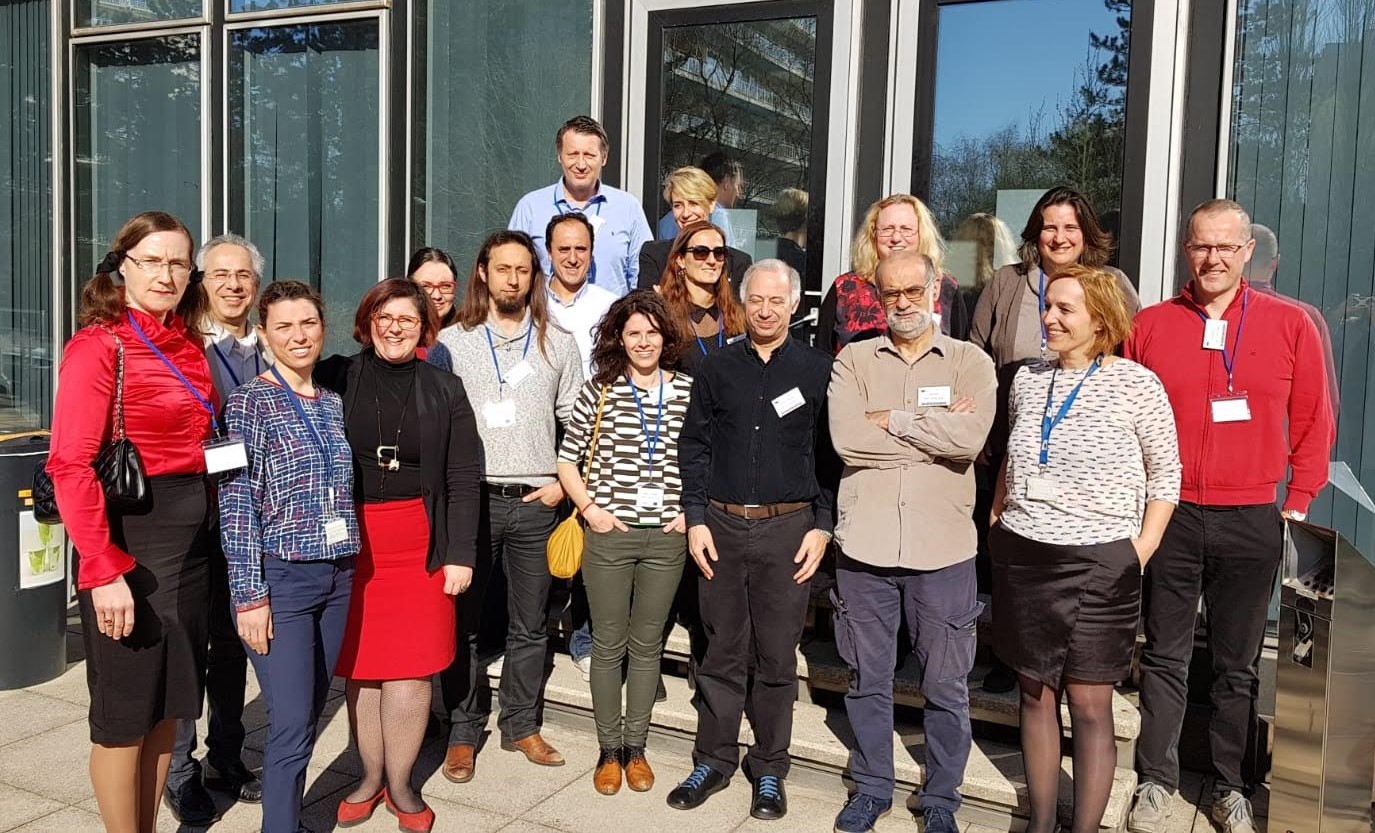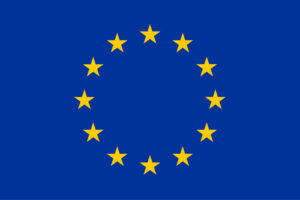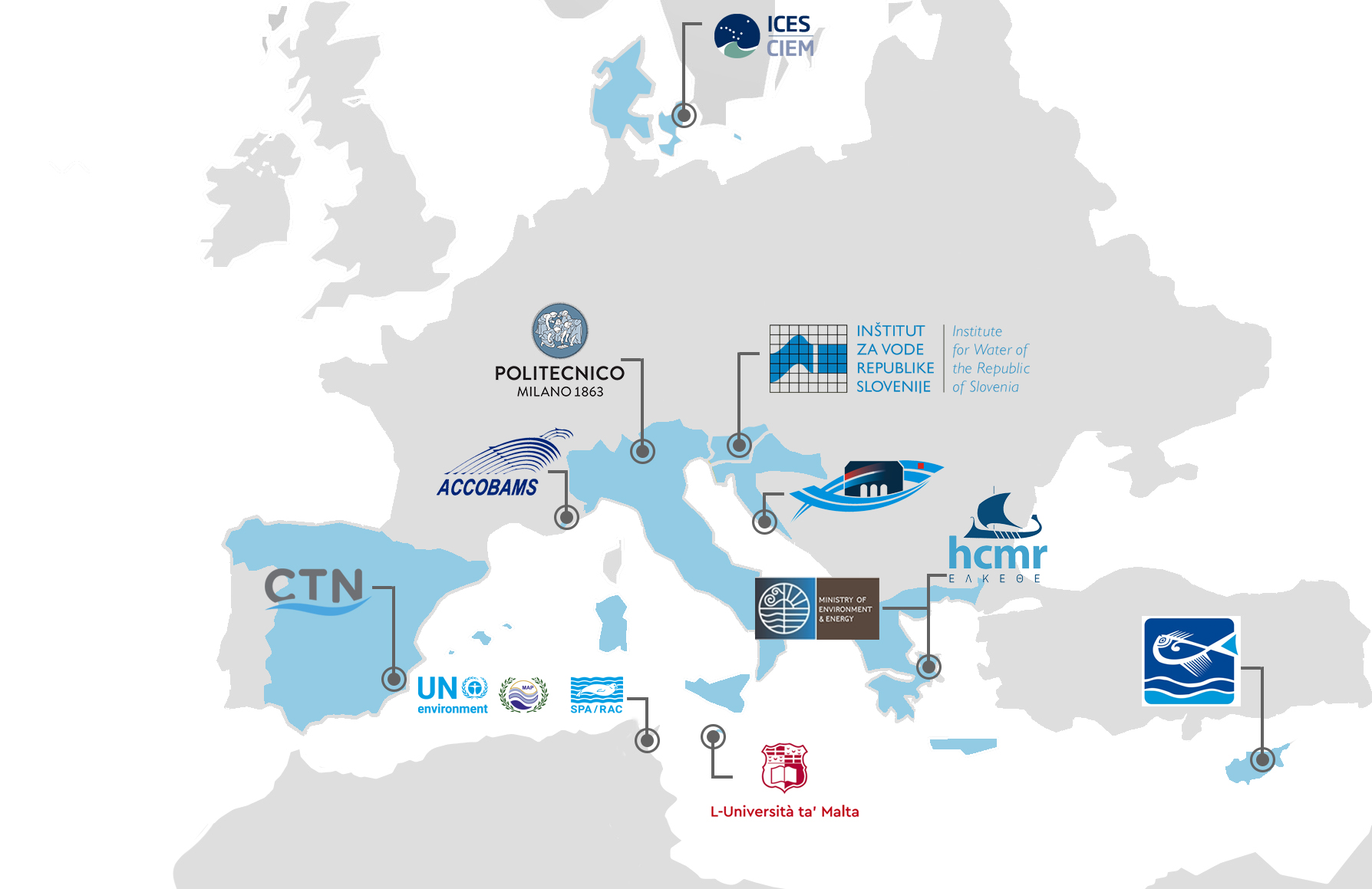Partners
The Project is developed by a consortium made up of 11 entities coordinated by CTN
The consortium is made up of 11 entities from 8 EU Member States (Spain, Italy, Malta, Greece, Cyprus, Croatia, Slovenia and Denmark) and 7 of these Member States share marine regions and sub-regions (The Western Mediterranean Sea, the Adriatic Sea, the Ionian Sea and the Central Mediterranean Sea and the Aegean Sea). These entities are the most relevant organizations in each Member States to support the national implementation of the MSFD due to their expertise and skills related to underwater noise. The consortium includes ACCOBAMS which has been appointed by the Secretariat of the Barcelona Convention (UNEP/MAP) to develop a basin-wide strategy for underwater noise monitoring in the Mediterranean. SPA/RAC has also joined the consortium as an expert in biodiversity and protected areas and as a representative of Mediterranean non-European countries. The consortium also includes ICES, which provides scientific and advisory services of relevance for the ongoing implementation of the EU Marine Strategy Framework Directive and hosts the OSPAR and HELCOM Joint impulsive noise register.
CTN (Project coordinator)
Marine Technology Centre is an association of companies established in 2003 with the aim to improve the competitiveness of the overall marine and maritime sector through the development of new technological solutions and technology transfer. CTN encourages the integration of all the actors of the sector with the aim to improve the cooperation and collaboration among them, the search of new business opportunities, the preparation of new innovative solutions and the development of Research and Development projects.
ACCOBAMS
Permanent Secretariat of the Agreement on the Conservation of Cetaceans of the Black Sea, Mediterranean Sea and Contiguous Atlantic Area is an Intergovernmental Agreement aimed at achieving and maintaining a favorable conservation status for cetaceans though the implementation of coordinated measures. ACCOBAMS is in charge of supporting the implementation of the Agreement, in particular establishing the program of work and administrating the budget for the functioning of the Agreement. The budget is provided by the Contracting Parties through ordinary contributions and voluntary contributions. The budget is adopted by the Meeting of the Parties for triennium periods, as well as the program of work.
DFMR
Department of Fisheries and Marine Research has developed activities in multidisciplinary fields, concerning the sustainable use of marine resources, the development and sound management of fisheries and aquaculture, the marine ecology, the protection of endangered species and habitats, physical and chemical oceanography, and the prevention and combat of marine pollution.
IZVRS
Institute for water of the Republic of Slovenia is one of the leading institutions for sustainable water management, designing applied solutions for water resource management, use, watercourse management, and water protection with 60 years of tradition. IzVRS has competences in problem solutions in integrated water and marine management, environmental impact assessments, biological pressures, water ecology, underwater noise, marine litter, ballast water management, preparation of programmes of measures, marine spatial planning, socio-economic analysis, and ecosystem services.
HCMR
Hellenic Centre for Marine Research is a Governmental Research Centre that belongs to the Ministry of Education, Research and Religious Affairs, General Secretariat for Research and Technology. It is the main organization for Oceanographic, Fisheries and Inland Waters, Marine Biology and Genetics, and Aquaculture research in Greece, constituted of three relevant Institutes. The staff totals approximately 480 people comprising researchers, technicians, administrative and secretarial employees.
IOF
Institute of Oceanography and Fisheries, as a main Croatian marine institute and represents Croatian marine referral centre and provides expertise and technical advice to relevant Ministries (Research, Environment, Fisheries, agencies and authorities at national and regional level. IOF represents Croatian National Oceanographic Data Centre (NODC) and has been participated in the international cooperation and networking activities with more countries (eg. Italy, USA, France, Germany, Norway, Greece, etc.), and international organizations (FAO, IOC).
UM
The Conservation Biology Research Group within the Department of Biology, Faculty of Science is a research group of the University of Malta. It focuses on research work related to biodiversity and its safeguard from anthropogenic impacts. It has worked extensively in the marine sector.
POLIMI-DICA
The Department DICA (Civil and Environmental Engineering Department) of Politecnico di Milano has developed activities in multidisciplinary fields, concerning the sustainable use and management of environmental resources, and the prevention and control of environmental pollution. DICA has been involved in numerous EU projects. Concerning underwater noise the research group has been collaborating (since 2000 up to 2009) with the NATO Centre for Maritime Research and Experimentation (NATO-CMRE formerly known as NURC, La Spezia, Italy) under the framework of the SOLMAR (Sound, Oceanography and Living MArine Resources) Project, mostly focusing on development of methods for predicting the risk of military sonar activities associated to the presence of sensitive species.
SSW
Special Secretariat for Water of Hellenic Ministry of Environment and Energy is responsible for the implementation of the Marine Strategy Framework Directive, as incorporated in the national legal system with the Law 3983/2011 (Governmental Gazette A 144).
SPA/RAC
Regional Activity Centre for Specially Protected Areas was established in Tunis in 1985 by decision of the Contracting Parties to the Convention for the Protection of the Mediterranean Sea Against Pollution (Barcelona Convention), which entrusted it with responsibility for assessing the situation of natural heritage and assisting the Mediterranean countries to implement the Protocol concerning Specially Protected Areas and Biological Diversity in the Mediterranean (SPA/BD Protocol), which came into force in 1999.
ICES
International Council for the Exploration of the Sea is a global science organization for enhanced ocean sustainability. ICES Science and Advice considers both how human activities affect marine ecosystems and how ecosystems affect human activities. In this way, ICES ensures that best available science is accessible for decision-makers to make informed choices on the sustainable use of the marine environment and ecosystems. ICES is a network of more than 5000 scientists from almost 590 institutes, with 1500 scientists participating in activities annually.

Keep updated!
Sign up to QUIETMED2 Newsletter to get the latest news

This project has received funding from DG Environment of the European Commission within the “DG ENV/MSFD 2018 call” under grant agreement No. 110661/2018/794481/SUB/ENV.C2
Follow the project on:

